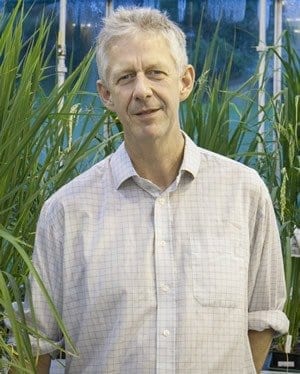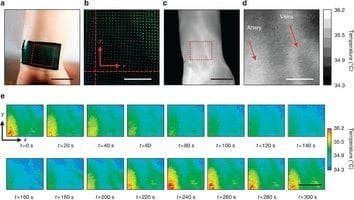
Credit: Phil Roberts, University of York
-
Scientists discover variant plants with straw that is more easily digested for biofuel production
-
Critically the plants are not significantly smaller or weaker than normal plants
-
The discovery could make biofuels from plant residues easier and cheaper to make, reducing pressure on food crops used for biofuels
Manufacturing biofuels from food crop by-products such as straw could be made quicker and cheaper thanks to the work of scientists in the UK and France.
Researchers funded by the Biotechnology and Biological Sciences Research Council (BBSRC) have discovered variant straw plants whose cell walls are more easily broken down to make biofuels, but which are not significantly smaller or weaker than regular plants.
The discovery could help ease pressure on global food security as biofuels from non-food crops become easier and cheaper to make.
The impact of carbon emissions on global warming is driving the need for carbon neutral biofuels. Many existing biofuels are produced from crops which can be used for food, and therefore have a negative impact on global food security.
One answer is to make fuels from woody, non-food parts of plants such as straw. These are rich in polysaccharides (sugar chains) which can be broken down into simple sugars and then fermented into ethanol for fuel. However, such biofuels are currently too expensive because of the cost of digesting the woody tissues into simple sugars.
Researchers in the Centre for Novel Agricultural Products at the University of York led by Professor Simon McQueen-Mason, working with colleagues in France, screened a large collection of variants of the model grass species Brachypodiumfor digestibility. Screening variants in this way allows rapid assessment of the range of natural diversity that can be found in a species.
Using this approach, PhD student Poppy Marriott identified 12 independent plant lines with highly digestible straw, but which grew normally and showed no decrease in straw strength. Analysing these plants showed that increased digestibility can be achieved through a range of changes in the cell wall, where the majority of sugar is contained in woody biomass.
In addition the team at York also showed they can identify the gene alterations that give rise to the high digestibility. The new results are published in the latest edition of the Proceedings of the National Academy of Sciences USA.
The Latest on: Biofuel production
[google_news title=”” keyword=”Biofuel production” num_posts=”10″ blurb_length=”0″ show_thumb=”left”]
via Google News
The Latest on: Biofuel production
- Money Laundering Trial for Reputed CIA Asset and Turkish Tycoon Pushed — Againon April 27, 2024 at 12:16 am
Sezgin Baran Korkmaz, who counts James Woolsey, the former CIA Director under President Bill Clinton and advisor to former President Donald Trump as a friend, was part of massive biofuel scam with ...
- Biofuel Scam Exposes Intrigue: CIA Ties, Turkish Tycoon and $1 Billion Fraudon April 26, 2024 at 7:38 pm
In what can only be described as a convoluted tale of international intrigue, a biofuel scam of monumental proportions has surfaced, involving an improbable assembly of individuals ranging from ...
- Solketal Industry Projected to Skyrocket to US$ 108.4 Billion by 2032, Fueled by Global Shift Towards Biofuelson April 26, 2024 at 8:29 am
The global solketal industry was worth US$ 76.85 Billion in the year 2022 and is expected to reach US$ 108.4 Billion by the year 2032 at a CAGR of 3.5% between 2022 and 2032. The solketal market is ...
- Researchers seek to scale ‘yeast fuel’ productionon April 26, 2024 at 7:34 am
Scientists at Thailand’s Chulalongkorn University say yeast and agricultural waste will play a key role in the development of renewable jet fuel for the aerospace industry ...
- Govt allows sugar mills to use 6.7 lakh tons of B-heavy molasses for ethanol production; here is how analysts view the moveon April 25, 2024 at 10:25 am
However, a week later, the government reversed the ban and allowed the use of cane juice and B-heavy molasses, but within the overall cap of a diversion of 17 lakh tonnes of sugar for ethanol ...
- Sugar Prices Slide as Conab Projects Record 2024/25 Sugar Production in Brazilon April 25, 2024 at 9:43 am
NY world sugar #11 (SBK24) this morning is down -0.32 (-1.60%), and Aug London ICE white sugar #5 (SWQ24) is down -8.30 (-1.44%). Sugar prices retreated today based on the outlook for a larger sugar ...
- Ethanol production hits 13-week lowon April 24, 2024 at 3:32 pm
U.S. ethanol production has declined for three weeks in a row, partially due to seasonal maintenance. The U.S. Energy Information Administration says production last week averaged 954,000 barrels a ...
- Higher ethanol gasoline blend on sale in US for third summeron April 24, 2024 at 10:27 am
Last week, the EPA said that due to global conflicts pressuring international fuel supplies, it will allow a higher blend of ethanol to be sold in the U.S. for the third consecutive summer ...
- India lets oil firms procure extra ethanol from sugar mills, source sayson April 24, 2024 at 7:42 am
India has agreed to allow oil marketing companies to procure ethanol by diverting an extra 800,000 metric tons of sugar for biofuel production, a government source said on Wednesday.
- Govt allows sugar mills to use 6.7 lakh tons of B-heavy molasses for ethanol productionon April 24, 2024 at 6:55 am
The government has allowed sugar mills to use 6.7 lakh tonnes of B-heavy molasses as feedstock for ethanol production in the current year. The move follows the industry's request to the food ministry ...
via Bing News










